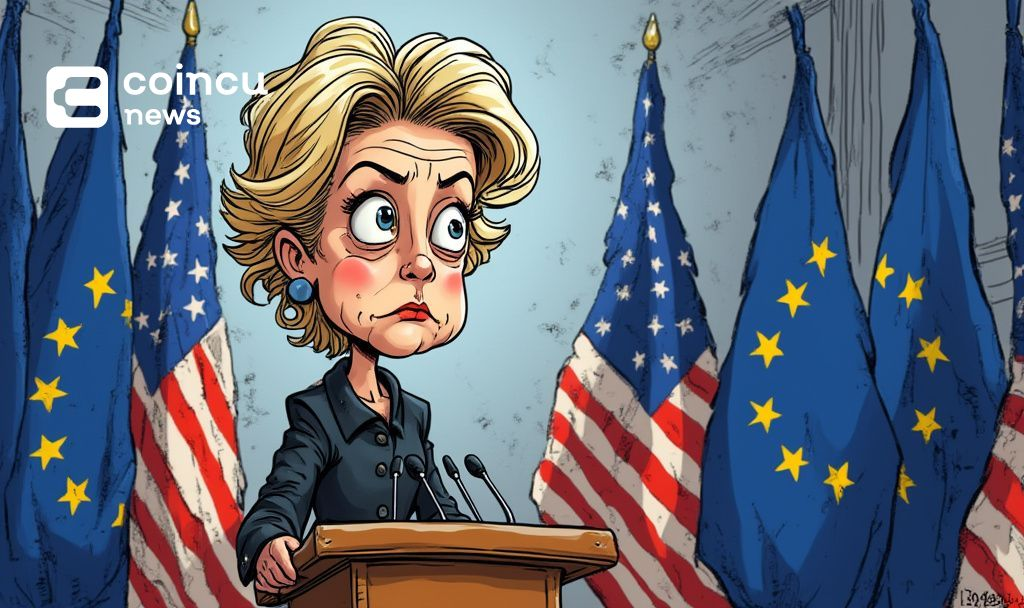 CaryptosHeadlines Media Has Launched Its Native Token CHT.
Airdrop Is Live For Everyone, Claim Instant 5000 CHT Tokens Worth Of $50 USDT.
Join the Airdrop at the official website,
CryptosHeadlinesToken.com
CaryptosHeadlines Media Has Launched Its Native Token CHT.
Airdrop Is Live For Everyone, Claim Instant 5000 CHT Tokens Worth Of $50 USDT.
Join the Airdrop at the official website,
CryptosHeadlinesToken.com
15h10
4
min read 
The French debt is currently raising serious concerns. The surge in the ten-year yield, which recently approached 3.4%, illustrates the colossal challenges facing the government. On one hand, the Minister of the Economy, Éric Lombard, must deal with a skyrocketing interest burden. On the other hand, the risk premium, nearing 90 basis points, serves as a reminder that the gap is gradually widening with Germany and is dangerously approaching Italy.


Soaring interest rates
The rise in French rates should not be viewed in isolation. Sovereign yields are climbing everywhere, particularly as a result of American inflation.
In just a few months, the ten-year rate in the United States has jumped from around 3.7% to over 4.6%, with the symbolic threshold of 5% in sight.
This progression, fueled by a stricter monetary policy from the Federal Reserve, is pulling all rates upwards. In London too, British debt is experiencing a dangerous escalation.
By extension, the eurozone is not escaping this trend. Since January 1, the European Central Bank has completely ceased purchasing sovereign bonds, thus ending its policy of quantitative easing.
A direct consequence: private investors now have to absorb the gigantic mass of public debt issuances. France plans to raise nearly 300 billion euros in 2025, which adds to a total volume exceeding 1,000 billion across all European countries.
The sudden rise in the French rate, which has already jumped 20 basis points since the beginning of the year, could weigh heavily on the budget balance. François Villeroy de Galhau, Governor of the Bank of France, emphasized: the interest burden will soon threaten to equal, or even exceed, the national budget for Education.
This situation creates a real puzzle for Éric Lombard, already under pressure to contain the public deficit and reassure increasingly volatile financial markets.
A budgetary climate under close observation
In this climate of uncertainty, the government’s margin for maneuver is shrinking. Promises of tax relief or massive investments are likely to clash with the reality of a debt that is becoming more costly to finance.
Speculation about a possible retreat on pension reform is not helping matters. Bond managers fear any compromise that could further deepen public accounts and fuel market distrust.
Another point of vigilance: the risk premium. Already at 86 basis points, it continues to deviate from the German Bund, a benchmark of stability in the eurozone. Any further slipping would bring France closer to the Italian profile, often deemed more unstable. In the background, the fear of a downgrade of the sovereign rating looms, which could further drive up yields. Meanwhile, the market is preparing to enter an explosive phase.
Maximize your Cointribune experience with our “Read to Earn” program! For every article you read, earn points and access exclusive rewards. Sign up now and start earning benefits.


Fasciné par le bitcoin depuis 2017, Evariste n’a cessé de se documenter sur le sujet. Si son premier intérêt s’est porté sur le trading, il essaie désormais activement d’appréhender toutes les avancées centrées sur les cryptomonnaies. En tant que rédacteur, il aspire à fournir en permanence un travail de haute qualité qui reflète l’état du secteur dans son ensemble.
DISCLAIMER
The views, thoughts, and opinions expressed in this article belong solely to the author, and should not be taken as investment advice. Do your own research before taking any investment decisions.












